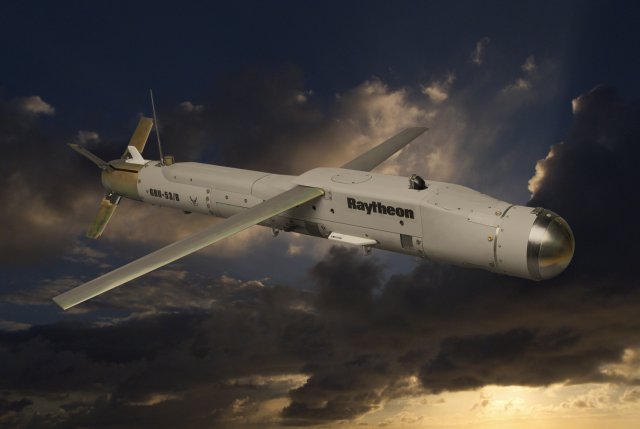SDB II can strike
targets from a range of more than 40 nautical miles, with a dynamic
warhead that can destroy both soft and hard targets. The bomb can also
change targets in-flight through the use of a secure datalink.
"The Milestone
C decision enables us to begin putting this game-changing capability
into the warfighters' hands," said Col Kevin Hickman, USAF SDB
II program manager. "The ability to strike moving targets with
extreme precision in adverse weather reduces an aircrew's time in harm's
way and limits collateral damage in the battlespace."
The Milestone C achievement follows a successful functional configuration
audit, production readiness review and system verification review. Milestone
C will lead to a positive acquisition decision memorandum validating
the preparedness of the company and the weapon system to continue to
production.
"Achieving Milestone C marks the hard work of the U.S. government
and Raytheon teams to verify that we meet or exceed the requirements
necessary for a Lot 1 production decision," said Jim Sweetman,
SDB II program director for Raytheon Missile Systems. "SDB II's
unique capabilities help ensure that our warfighters maintain their
unfair advantage in the fight."
About SDB II
SDB II employs Raytheon's unprecedented tri-mode seeker.The new seeker
operates in multi-attack modes: millimeter-wave radar, uncooled imaging
infrared and semi-active laser. These sensors enable the weapon to seek
and destroy targets, both moving and stationary, even in adverse weather
conditions from standoff ranges.
SDB II can strike targets from a range of more than 40 nautical miles,
with a dynamic warhead that can destroy both soft and armored targets,
while keeping collateral damage to a minimum through a small explosive
footprint. The highly accurate SDB II offers warfighters the flexibility
to change targets after release through a secure datalink that passes
in-flight updates to the weapon.
The Department of Defense has validated SDB II as a weapon that meets
a critical warfighter need and has invested more than $700 million in
the SDB II program.




















